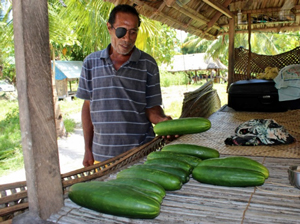Most people live a subsistence lifestyle in Kiribati, with few natural resources available on its coral atolls. Soil fertility is poor and in most cases soils consist of coral sand covered by a relatively thin layer of organic matter. Furthermore, climate change–through its impacts of sea-level rise leading to coastal erosion and more frequent storm surges–has reduced the potential for agricultural productivity.
AusAID is working with Live & Learn – Kiribati and the Government of Kiribati to promote economic development through agricultural diversification.
AusAID has contributed $600,000 to the project to train local farmers to grow vegetables and traditional crops including cucumbers, tomatoes, cabbages, coconuts and breadfruits. Villagers can then sell these crops in the market, generating income for their families.
Mr Ritake Tokoki, Chairman of Tamoa village in South Tarawa said this project has been very popular in his village, with men and women from most families taking part (around 88 households).
'It gives people something to do and they have income in return,' Mr Tokoki said.
'The kids also now like to eat vegetables, which were previously not part of their diet.'
The Ministry of Environment, Lands and Agricultural Development is researching crops that will grow well in Kiribati while Live & Learn teaches farmers how to make compost with organic material available in the village.
AusAID has also provided villages with greenhouses to increase crop productivity.
All of the funds generated from the crops are directed back into the community, with 90 per cent going to the farmers who grow the crops, and 10 per cent shared with other households.
The project is currently being run in Tarawa, Abaiang and Tabiteuea, with plans to expand across Kiribati.

